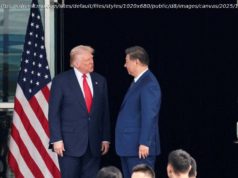The Russian president is the first foreign leader to be protected from online criticism in China.
Chinese President Xi Jinping and Russian President Vladimir Putin have been exchanging niceties for months now, but their game of “I’ ll scratch your back if you’ ll scratch mine” took on a whole new level over the weekend when Xi ordered China’s largest social media platform, Sina Weibo, to block potential criticism of Putin.
While Xi and Putin were at the G20 conference over the weekend, bloggers on Sina Weibo with more than 1,000 followers discovered that they were no longer able to mention Putin in their posts. If they do, they get a blunt notification: “This post does not allow commenting.”
This isn’ t the first time the Chinese government has censored the internet through “keyword blocking, ” nor is it the most bizarre case. Just to understand how widespread this is, the name of the band “Hoobastank” is banned on Weibo for containing the word “tank” — one of several terms blocked for its military associations. A comprehensive list of banned words is available here.
Weibo is a microblogging site similar to Twitter and Facebook that has 340 million daily users. It has been regularly ordered not to allow anti-government sentiment, feminist activism, and pornography on its various platforms. In other words, the censorship itself isn’ t surprising; whom it protects is.
Putin is the first foreign leader to be protected by China’s Great Firewall, said Cai Shenkun, a Beijing-based columnist and critic, to the Financial Times. Analysts also told FT that the Chinese Communist Party rarely extends the safeguards they use to protect themselves to foreign leaders since they see that criticism as a way to expose the weaknesses of democratic systems.
The government’s willingness to make an exception and extend this privilege to Putin reflects the growing affinity between the two countries, which experts say has been brokered by a weaker US global presence. It also suggests that Putin’s efforts to pivot strategically toward the East in the past few years are paying off.
In 2014, Russia successfully signed a $400 billion deal with China to build a pipeline to export natural gas from Western Siberia to the Xinjiang region in China despite a history of mistrust between the two countries. Relations have warmed since then: In May, Chinese officials cheerfully reported that the project was on schedule to be completed in 2018, and that China had signed another joint venture with the Russians on petrochemical refinery.
During a two-day state visit to Moscow last week, Xi told Russian media that relations between the two countries are at their “best time in history.” Putin returned the sentiment, presenting Xi with the Order of St. Andrew, Russia’s highest state award, which has only been granted to two other heads of state: former Azerbaijani President Heydar Aliyev and Kazakhstan President Nursultan Nazarbayev.
The visit also included a lot more than symbolic gestures.
The two leaders signed at least 30 different agreements, including a $10 billion investment fund and an $850 million innovation fund. They also presented a united front toward North Korea’s launch of an intercontinental ballistic missile last Tuesday, releasing a joint statement that called for an end to both Pyongyang’s nuclear program and the current US-South Korea military exercises.
With this newest block on Putin’s name on Weibo, the Chinese government shows it’s willing to make exceptions for Russia that it hasn’ t before. President Trump has turned social media into one of the most powerful tools of his time in office. When it comes to Putin, Xi is doing the same.






